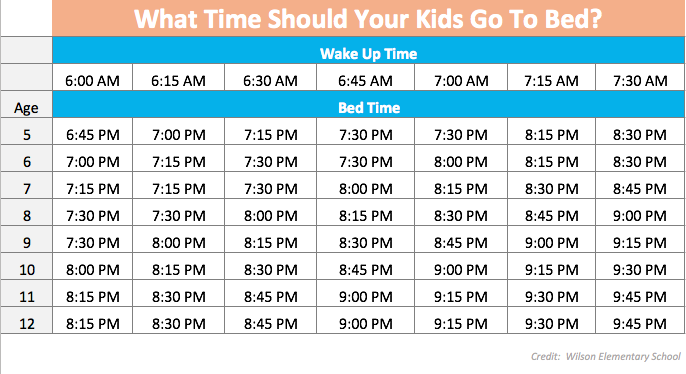With the bump of technology, some kids might even be better than us in terms of gadgets and devices. As a matter of fact, there are kids who spend their days most of the time in front of smartphones, laptops, and tablets. This habit is bad of course as we mentioned in our previous article. Nevertheless, there are kids who sleep late and fail to cope with requirements in resting because of these gadgets. What time does your children sleep? Did you know that there are certain requirements depending on their age? If not, continue reading…
Read: Excessive Gadget Use of Today’s Generation – Might Be Dangerous For Your Children
When you were a kid, chances are sleep is not your best friend as well. Now that you have kids around, whether or not they’re your kids or not, you know how difficult it is to make them sleep.

Trying to get them to sleep early might not be the best plan for you. Why? Because you might fall asleep, causing them to be active and hyper when you are. If they sleep late, they’ll be mad and grumpy the next morning.
The problem is doubled if you’re working and you want to maximize the amount of time that you get to spend with your kids. Well, to tell you, you’re not alone in this dilemma. As a matter of fact, Wilson Elementary School in Kenosha, Wisconsin, recognized that parents were struggling with this very conundrum and provided a little chart in order to help them out.
A chart for a kid’s sleeping schedule?
Yes, they made a chart that is based on the age and the time that the child needs to be woken up at. For example, you have a 6-year-old children that needs to be awake at 6:30 a.m., the chart will tell you that they have to be sleeping before or by 7:30 p.m. An 11-year-old, however who has to be up at the same time. is able to stay up later than them – until 8:45 p.m.
If you think that the chart is just made up by the school, think again. The chart actually follows the sleep recommendations by the American Academy of Pediatrics for kids. As per their guidelines, kids who are three (3) to five (5) years old should be getting at least 10-13 hours of sleep per day. While kids aged six (6) to twelve (12) are fine with 9-12 hours.

With this chart, you now have a guide on whether what time you should put your kids to bed which is of course essential for their overall development.
How can I put my kids early to bed?
Especially if you’re working late nights, chances are your kids will be there with you, too. Here are some of the tips you can use to strictly follow the chart’s sleeping schedules and of course for your kid to be as healthy as they can be:
Make a bedtime routine
You can’t just force a child to sleep every single night. By making a bedtime routine, you can efficiently and easily put them at ease and to bed as well. Children actually thrive on structure and nurturing as it gives them peace of mind and security. They loathe being forced in doing things.
So what routines can I create?
There are a lot of ways, honestly. You can start by not allowing them to watch TV or watch through smartphones, laptops, and tablets. Make it a habit that 30 minutes from their scheduled rest, no one should be facing a gadget. There are other things to set them up for sleep which will actually make them excited; things like:
- Brushing their teeth;
- Drinking milk;
- Putting on pajamas;
- Bedtime prayers;
- A relaxing bath;
- Bedtime stories
These things could be your leverage. Do these frequently so that they know they need to sleep after doing these things.
A healthy and ideal sleeping environment
No child wants to sleep in a space where there are a lot of things. This can make them uncomfortable and they can continue on being awake. Clean rooms and put on designs as these can be appealing to them. Make their rooms dim but not totally dark as it can scare them. If they’re sleeping in your bedroom, make it a habit to have the lights dim enough so they won’t be distracted by the light.
Turn off your internet
If they tend to watch videos and play games, make sure to turn off your internet connection. Although we’ve said that they need not to be in front of their gadgets an hour or 30 minutes before bedtime, keeping your internet connection off can complement it.
Eat dinner hours before they go to bed
It is never in our intention to hunger them in fact, them having a full tummy could make them want to play more because they’ll be more energetic. Make it a habit to have dinner 1 to 2 hours before bedtime. If they ask for some food, give them a glass of milk and cookies or biscuit. Most of the time, the idea of them asking for food is just them providing themselves leeway time to be awake.
As of the moment, the chart is spreading shares acrossFacebook, and for good reason. Getting an adequate amount of sleep per day is vital to the good health and development for the whole family – not just for kids. As a matter of fact, a recent study done by Serene Yoong (Ph.D.) from Hunter New England Population Wallsend in New South Wales, Australia found that young children who do not have consistent sleep schedules are nearly twice as likely to experience obesity when they reach 11 years old than those who have regular and consistent sleep.

Another study in the same context done by Dr. Jon Quach of the Murdoch Children’s Research Institute and The University of Melbourne found that children who are early-to-sleep have a better health-related quality of life. Moreover, their mothers have better mental health as compared with children who are late-to-sleep.
How do we do it?
Although a lot of us might think that calming a child to go to bed is difficult, it actually isn’t. This is why you should establish a deep and concerning connection between you and children. Why? Because the only reason they don’t follow you when you tell them to sleep is because they don’t understand why. Of course, they’re kids, they really won’t. This is where health and internal connections come in.
Read: Subtle Signs That Your Child May Have Anxiety
Do not scold them if they don’t want to sleep during the recommended hours, do not blame them for it. Instead, focus on how you can put them to bed to ensure that they get proper development and health when they grow up.
Sleep is a necessity; children should be aware that it is because the moment they reach the ages where they won’t get enough sleep, they would want to go back to the times when they could. If you think that your children can stay up late more than they should, it might be a different psychological concern so visit a healthcare professional immediately. Nevertheless, making them go to bed is neither as simple as ABC nor as difficult as rocket-science. You just need to be with them and to properly educate them on why they need sleep.

